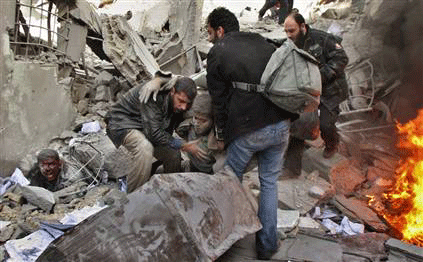
Palestinian rescue workers carry a wounded prisoner in the rubble of the Saraya prison after it was hit by a missile strike on Sunday. Photo by Majed Hamdan / AP.
Gaza: the cycle can be broken
The Independent/, Sunday, 28 December 2008
More than 30 years ago, the American political philosopher Michael Walzer wrote: “First oppression is made into an excuse for terrorism, and then terrorism is made into an excuse for oppression.” It was a good description of the Israel-Palestine problem then, and a good description of the dynamic that would make it worse over the following three decades.
It is a dynamic that operates in contravention of the simple, comforting and wrong principle that two democracies have never gone to war against each other.
The conflict between Israel and the people of Gaza is driven by democratic impulses. Hamas, the Islamic political party and paramilitary organisation, won control of the Gaza Strip in free and fair elections in January 2006. Its charter famously calls for the destruction of the state of Israel and, although that was hardly the issue on which those elections were fought, there can be little doubt about the depth and extent of hostility towards Israel felt by the majority of the population of Gaza.
On the other side, Israeli politics are dominated at the moment by the campaign for Knesset elections on 10 February in which Tzipi Livni faces the hawkish Binyamin Netanyahu. Ms Livni, having advocated a policy of restraint, now supports the use of military force against the Hamas infrastructure.
The recent story of Israeli public opinion is one of retreat from the possibility of a two-state solution. Most Israelis were willing to negotiate in principle, but have become increasingly convinced that they have no one with whom to negotiate. The Fatah faction, led by Mahmoud Abbas, the President of the Palestinian Authority, which controls the West Bank, cannot deliver Gaza; and Hamas, which can, refuses to negotiate.
At some point, this cycle must be broken. It will not be this weekend, however. The most that can be done today is to urge the Israelis not to follow up their air strikes on targets in Gaza with a ground assault. In doing so, the word “counter-productive” is more likely to appeal to Israeli self-interest than the word “disproportionate”.
There are, in any case, problems with the notion of proportionality in situations such as these. No state can be expected to tolerate rockets being launched at its civilians. No leader of such a state can be expected to shrug and say that it is not worth trying to stop small mobile rockets being fired from high-density residential areas. On the other hand, the persuasive argument against too heavy a military response is that it is counter-productive.
The last time that Israel launched an all-out military attack on territory from which terrorist rockets came – in Lebanon in 2006 – it did nothing to enhance long-term security for the Israeli people. Its main effect was to recruit a new generation of soldiers for Hizbollah, just as the main long-term impact of yesterday’s air strikes on Gaza may be to recruit new armies for the most fundamentalist elements of Hamas.
Even in the midst of this depressing new turn of the cycle of violence, however, there may be hope. Already, we can imagine how Barack Obama, as US President, might respond to this bloodshed, and contrast it with George Bush’s refusal to criticise the Israeli action in Lebanon.
No one should be naive about the ability even of a visionary leader such as President-elect Obama to change the realities on the ground in the Palestinian territories and to break this cycle of violence. But there are always grounds for hope. Before yesterday’s attacks, there were some signs that disillusion with Hamas was setting in among the people of Gaza. Partly because of the continuing Israeli blockade, Hamas has failed to deliver higher living standards. Some Gazans even complain that life was better under the Israeli occupation.
Equally, most of the Arab world has lost patience with Hamas – most importantly the Egyptian government, which helped broker the recent ceasefire.
If Israel draws back now, it is possible that such erosion of Hamas support could continue. If there is a pragmatic wing of Hamas, it may be possible to strengthen it. A policy of restraint sounds like a politician’s platitude, but in this case it is the wisest course of action.
There are precious few signs of hope in the Middle East today. But it is possible to imagine how, over time, Hamas could be given fewer excuses for terrorism, and Israel fewer excuses for actions that are bound to be seen as oppressive.
It is not because Barack Obama is a liberal that he offers hope, but because he has a creative and sympathetic intelligence. If the cycle is to be broken, his inauguration may be the moment.